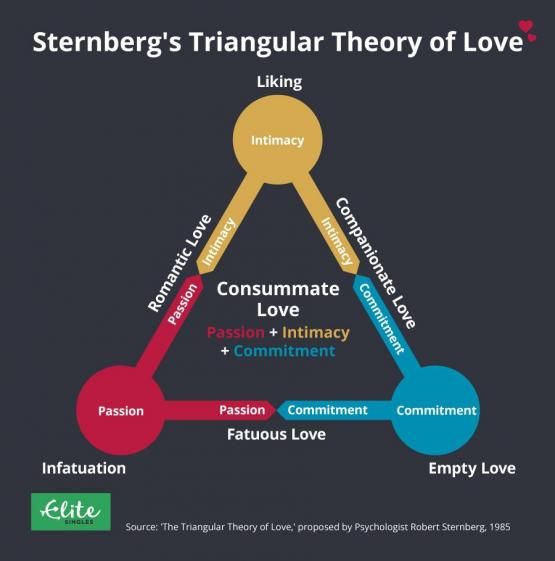We often see people fall in and out of love every now and then. Love can actually help move mountains while love can also break a person apart. Everyone is curious about Love. The wonders of love made the psychologists to become interested in it causing them to find out what it really is.
Theories about Love
There are many researches about the science of love and there are theories formed in the process. We listed down the most popular ones that will explain the meaning of love and other emotional attachments:
Liking vs. Loving

Zick Rubin, is a social Psychologist, who is one of the researchers that made an instrument to measure love. He used 2 questionnaires which has 13 ‘liking’ questions and 13 ‘loving’ questions. These questions were believed to be able to assess the person’s attitude towards significant others. In his research, he said that love is actually made up of three elements: Attachment, Caring and Intimacy.
Attachment: The need to be taken care of and be with a significant person. Physical contact and approval are important factors in attachment.
Caring: Taking care of the significant other like how you take care of yourself and wanting only happiness for them.
Intimacy: Sharing your thoughts, feelings, emotions and even your desires with your partner or significant person.
Passionate love vs. Compassionate Love

Elaine Hatfield is not only a social psychologist but is also a known professor in the University of Hawaii. Together with her colleagues, they were able to discover two different types of romantic love: compassionate love and passionate love.
Passionate love was said to be a “state of intense longing for union with another person”. It often occurs during the start of the relationship where 2 persons feel an extreme attraction for each other. It is characterized by strong emotions, sexual attraction, anxiety and affection and when the significant person reciprocates these feelings, they feel happy and loved. Passionate love does not last long and can only last for as short as 6 months to as along as 30 months.
The other type of romantic love identified is the compassionate love. Unlike passionate love, this type of love has a greater intensity and is characterized by a different level of intimacy. It is not just about attraction and desires, but it focuses on the trust, commitment and affection between each other. Long-term relationships usually started with passionate love then quickly evolve to a compassionate love after 1 to two years. This type of love is deeper and commitment is given importance.
Color Wheel

Psychologist John Lee wrote a book entitled “The Colors of Love” where he compared the different types of love to the 3 primary colors of the color wheel. The three primary types identified are: eros, ludus and storge.
Eros – It is a Greek term which mean romantic, passionate or sexual love. Lee described eros as the physical and emotional love between two people which they want to fulfill together. This gives a sense of contentment, security and enjoyment for each other. The center of their relationship is their sexual bond and considers marriage as the extension of the honeymoon phase. Erotic lovers are commonly the people who falls in love at first sight.
Ludus – It is a Latin term that means “game” or “school”. These are the people who are up to adventures and to having fun by doing indoor or outdoor activities. They bond through having fun together and they find ways to entertain their partner as much as possible. Ludic lovers are one to not reveal their true feelings when they feel like they have an advantage of the other person. They are look for partners that are of the same thinking as them. Sadly, ludic love are prone to infidelity issues.
Storge – It is a Greek term which means “familial love”. The meaning itself gives you an idea on what it about. Rather than having a passionate relationship, it focuses more on the common interests and commitment between each other.
Triangular Theory of Love

Robert Sternberg, a known psychologist, wrote about his theory that love has 3 components: intimacy, passion and commitment. In his research, he said that these 3 are interactive and that the 7 kinds of love is a combination of two or more components of love. Intimacy involves the feelings of closeness, connection and bonding between each other. Passion is responsible for the desires and feelings that lead to the act of romance and sexual activities and lastly, decision or commitment involves the feelings of remaining with a person and continuing life together with them to achieve their goals. Here are the 7 types of love that was identified by Sternberg:
Consummate love- This love sums all the three components and is the ideal type of love to have in a relationship. They are committed to their partners and cannot see themselves in a different relationship. Couples who has this kind of love has a long-lasting relationship.
Companionate love– This kind of love longs for intimacy but lacks passion. It involves commitment and love stronger than friendship but has minimal desires for their partner. This can be seen on married couples who lost the spark in their marriage.
Fatuous Love– In this type of love, commitment and passion here but the intimacy or liking is absent. Marriages with this type of love often doesn’t last long.
Romantic Love– This type of love involves intimacy and physical passion towards each other. It has intimacy that lead to deep discussions about each other. Couples who have romantic love has a sexual life full of passion and affection.
Empty Love– The name speaks for itself, it’s empty. Meaning, the commitment between 2 people has no passion or intimacy involves.
Infatuation– This type of love is commonly heard. This type of love is full of feelings of lust and physical passion without commitment or liking of the other person. It lacks the deeper understanding of each other as both are too preoccupied with their physical desires.
Friendship– It involves intimacy and like but there is just no feelings of passion or commitment for each other. Some friendships evolves to form another type of love while others just maintain their friendship.
Love is such a subjective statement that no one can measure accurately how much a person can love. Luckily, these Psychologist took their time to try and understand love. Their passion for research led them to the development of such wonderful theories that will help us understand something about love that we never did before.
